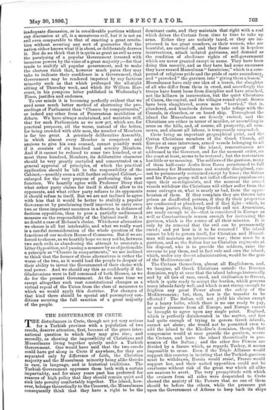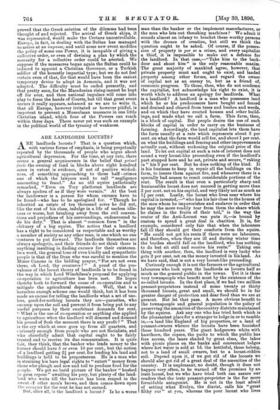THE DISTURBANCE IN CRETE. dominant caste, and they maintain that
right with a zeal which drives the Cretans from time to time to take up arms. Either they are unfairly taxed, or they are im- prisoned in too great numbers, or their women, who are beautiful, are carried off, and they flame out in hopeless insurrections, attack isolated garrisons, and demand as the condition of obedience rights of self-government which are never granted except in name. They have been doing this recently, and as they have had some successes they have roused Ilussulman " fanaticism," which is a com- pound of religious pride and the pride of caste ascendency, and " provoked " the garrison into" giving them a lesson." Mussulmans have only one idea of a lesson, the slaughter of all who differ from them in creed, and accordingly the troops have burst loose from discipline and have attacked, not the hillmen in insurrection, but the quiet Christians of Canes, the capital, and the villages round about. Scores have been slaughtered, scores more "harried," that is, plundered, and hundreds driven to take refuge with the Consuls, in churches, or on board ship. Throughout the island the Mussulmans are fiercely excited, and the Christians are either in terror of murder, or assembling in arms on the hills, and, of course, all prosperity, all com- merce, and almost all labour, is temporarily suspended. Crete being an important geographical point, and the Cretan Christians members of the Greek Church, all Europe at once intervenes, armed vessels belonging to all the Powers appear off the island, remonstrances are addressed to the Governor, and for the moment order, on the coast at least, seems to be restored ; but the restoration has little or no meaning. The soldiers of the garrison, many of them half-caste Arabs from Barca accustomed to full ascendency for Mussulmans and scarcely disciplined, can- not be permanently restrained except by force ; the Sultan and his Palace group will not inflict effective punishments upon their co-religionists, and the moment the armed vessels withdraw the Christians will either suffer from the same outrages or, what is nearly as bad, from the appre- hension of them. If they complain they are thrown into prison as disaffected persons, if they fly their properties are confiscated or plundered, and if they fight—which, to do them justice, they, being Greeks and not Armenians, are ready enough to do—that is considered in Europe as well as Constantinople reason enough for increasing tho garrison, which is the source of all their miseries. It is only by its removal that the evil can be permanently cured ; and yet how is it to be removed ? The island cannot be left to govern itself, for Christian and Mussul- man will maintain an internecine war; there must be a, garrison, and as the Sultan has no Christian regiments at his disposal, who is to provide the soldiers, raise the revenue to pay them, and in fact rule and own the island, which, under any decent administration, would be the gem of the Mediterranean ?
The Cretans themselves, almost all Englishmen, and, we imagine, all Greek Christians outside the Russian dominion, reply at once that the island belongs historically and by all ties of race, creed, and civilisation to Greece, which is quite ready to accept the burden, which governs many islands fairly well, and which is not strong enough to frighten any great Power about the safety of the Mediterranean ; but, then, how is the transfer to be effected F The Sultan will not yield his claims except for a heavy bribe, which there is no one ready to pay, or under pressure from all Europe, and Europe cannot be brought to agree upon any single point. England, which is perfectly disinterested in the matter, and has had quite enough of trying to govern Greek islands, cannot act alone ; she would not be permitted even to add the island to the Khedive's dominion, though that compromise would at once provide the garrison, secure the Cretans, and leave the island theoretically in pos- session of the Sultan ; and the other five Powers are divided by a, fissure which, as regards Turkey, it seems impossible to cross. Even if the Triple Alliance would support this country in insisting that the Turkish garrison must be withdrawn, Russia. would resist, France would support her, and their united opposition could not be overborne without risk of the great war which all alike are anxious to avert. The very promptitude with which the cruisers from all sides were despatched to Crete showed the anxiety of the Powers that no one of them should be before the others, while the pressure put upon the Government of Athens to keep back its ships proved that the Greek solution of the dilemma had been thought of and rejected. The arrival of Greek ships, it was represented, would make the Cretans uncontrollable. Europe, in fact, in dealing with the Sultan has managed to arrive at an impasse, and until some new event modifies the policy of some one Power, it is incapable of giving a collective order, or even of devising a plan by which the necessity for a collective order could be averted. We suppose if the massacres began again the Sultan could be induced to appoint a Christian Governor, or a Turkish soldier of the honestly impartial type; but we do not feel certain even of that, for that would have been the easiest temporary device to adopt in Armenia, and it was not adopted. The difficulty must be ended presently, and that pretty soon, for the Macedonian rising cannot be kept off for ever, and then national impulses will come into play to force the hands of Courts, but till that great event occurs it really appears, ashamed as we are to write it, that all Europe, however irritated or however pitiful, is impotent to prevent a Mussulman massacre in one little Christian island, which four of the Powers can reach within three days. There never yet was such an example in the political world of the tyranny of weakness.



































 Previous page
Previous page